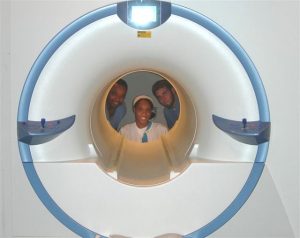 Patients who have to undergo a magnetic resonance imaging (MRI) scan may be spared the ordeal of having to lie still in the scanner for up to 45 minutes, thanks to new compressive sensing technology developed in the groups of Rice ECE faculty Richard Baraniuk and Kevin Kelly. The patented technology was recently licensed from Rice by Siemens Healthineers.
Patients who have to undergo a magnetic resonance imaging (MRI) scan may be spared the ordeal of having to lie still in the scanner for up to 45 minutes, thanks to new compressive sensing technology developed in the groups of Rice ECE faculty Richard Baraniuk and Kevin Kelly. The patented technology was recently licensed from Rice by Siemens Healthineers.
Magnetic resonance imaging (MRI) scanners equipped with compressive sensing operate much more quickly than current scanners. Siemens Healthineers has applied the technology to help solve an important clinical problem: how to reduce long scan times while maintaining high diagnostic quality. The result is the first clinical application of compressive sensing for cardiovascular imaging; it was approved for clinical use in February 2017 by the Food and Drug Administration. Thanks to compressive sensing, scans of the beating heart can be completed in as few as 25 seconds while the patient breathes freely. In contrast, in an MRI scanner equipped with conventional acceleration techniques, patients must lie still for six minutes or more and hold their breath as many as seven to 12 times throughout a cardiovascular-related procedure.
